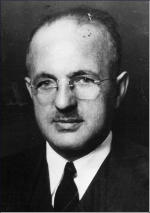No, I’m not writing about the administration you think. Instead, this is about the Franklin D. Roosevelt administration, which was inundated with Soviet spies in about every department, even at the highest levels. Previously, I wrote about the Roosevelt administration regarding Pearl Harbor (LINK). While I don’t believe the Soviets (Russians) influenced any of Roosevelt’s four successful elections, I do believe they had a great influence over our policy.
Enter Harry Dexter White with a Ph.D. in economics. A pre-eminent economics journalist and an advisor to Henry Morgenthau, Jr., Secretary of the Treasury, Dr. White was appointed to the Treasury Department in 1934. Soon thereafter, unbeknownst to the Administration or the Treasury, he joined the communist organization known as the Ware Group, which was led by Harold Ware, a member of the Communist Party of the United States. Ware worked closely with Joszef Peter, head of the underground section of the American Communist Party, whose plan was to influence policy at several levels of the government.
Dr. White was promoted through the Treasury Department until he was placed in charge of Monetary Research, and, by 1941, was assigned as Assistant to the Secretary. Dr. White was now in the position to exercise influence on U.S. foreign policy. His authority went beyond the scope of his defined position.
Dr. White was recruited as a spy by Jacob Golos, then passed to Vasily Zarubin, the head of the Soviet Embassy in New York. Zarubin started handling White for several reasons, Golos was ill and Zarubin recognized the potential of White.
In 1944, White was one of the most important figures at the Bretton Woods conference. He argued for the end of economic blocks and a greater use of free trade agreements. At the Bretton Woods conference, Henry Morgenthau, Jr., was instrumental in establishing the International Monetary Fund (IMF), among other international organizations, for the end of “economic nationalism.” White’s goal was for Western nations to develop better economic and political relationships with the Soviet Union.
On September 16, 1944, the Morgenthau Plan, written by Dr. White and Mr. Morgenthau, was presented to President Roosevelt at the Quebec Conference. The plan was discussed and approved by Winston Churchill. It called for the stripping and pillaging of post-War Germany, converting it into an agrarian society. All industrial plants and mines not destroyed by military action would be dismantled or destroyed. One of the most unbelievable points called for an extensive list of Germans who would be shot upon apprehension, while the rest of the population would be held down to a standard of living no higher than bare subsistence. This plan was basically what the Soviet Union did with occupied East Germany.
Someone in White’s department leaked the plan to the press. This created a gigantic political problem for President Roosevelt, who denied its existence. Ultimately, Roosevelt had to make a statement that his Treasury Secretary had made “a serious blunder.” When Joseph Goebbels learned of the Morgenthau Plan, the Nazis used the information to scare the German people into not surrendering, which prolonged the war and the Jewish holocaust. Immediately, Germany stiffened its resistance on the Western front. Until then, it was thought the Germans might discontinue resistance to Allied forces, out of fear of their fate of Soviet occupation. Clearly, this ugly plan prolonged the war by months and caused communism to spread not only to East Germany, but to other eastern European countries.
In December 1945, the FBI sent President Truman a report showing that Dr. White was a Soviet spy. Truman ignored the warning. In 1946, White was promoted to executive director of the U.S. Mission to the International Monetary Fund. Again, the FBI sent President Truman a second report regarding Dr. White being a spy for the Soviet Union, but the President did nothing.
Elizabeth Bentley testified before the House of Un-American Activities Committee (HUAC) on July 31, 1948, that Harry Dexter White was a Soviet spy. Bentley told the hearing, “We were so successful getting information… largely because of Harry White’s idea to persuade Morgenthau to exchange information.” She went on to say that at least “seven or eight agencies” traded information, including branches of the military.
On August 13, 1948, Dr. White appeared before the committee. Before the hearing, White had sent a note to J. Parnell Thomas, the chairman of the HUAC, asking for rest periods of five or ten minutes for each hour of testimony, as he was recovering from a severe heart attack.
During his testimony, Dr. White denied being a communist with this statement: “The principles in which I believe, and by which I live, make it impossible for me to ever do a disloyal act or anything against the interests of our country… I believe in freedom of religion, freedom of speech, freedom of thought, freedom of the press, freedom of criticism and freedom of movement.” He admitted knowing some of those communists identified by Bentley, but just because they played softball and volleyball together did not mean they were part of a spy network.
Thomas replied, “For a person who had a severe heart condition, you certainly can play a lot of sports.” White retorted he had played sports before he developed a heart condition.
On August 16, just three days after his testimony, Dr. Harry Dexter White died of a heart attack.
In 1953, Senator Karl E. Mundt issued a report to the Committee on Government Operations documenting that Dr. White’s hand-picked Treasury assistants had transferred currency plates, currency paper and currency ink to the Soviet Union. This treachery assisted the Soviet Union in firming up their occupation of Eastern Europe and Germany with the use of U.S. credits. The occupation currency would eventually be redeemed by the U. S. Treasury at the cost of tens of millions to the American taxpayer.
The Russians and the Americans have been spying on each other since Lenin came into power, and it will likely go on until the end of time. This is just one example.
Were you aware that Roosevelt had spies in his Administration?
